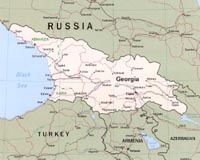 |
Caracas, Venezuela (UPI) Mar 8, 2009 The arrival of ousted former Honduran President Manuel Zelaya at Petrocaribe energy consortium has deflected attention from the group's financial woes, which require urgent attention, analysts said. Zelaya was appointed the head of a new political council in Petrocaribe, founded by Venezuelan President Hugo Chavez in 2005 and bringing together 18 Caribbean and Central American countries, as he prepared to begin a life of relative obscurity in exile in the Dominican Republic. Zelaya was deposed from the Honduran presidency in June 2009 and voted out of office in November. He spent much of September, October and November holed up in the Brazilian Embassy in Tegucigalpa, fighting for his job to be given back. The election of Honduras' new president, Porfirio Lobo, dashed Zelaya's hopes of returning to power but neither Chavez nor Zelaya have accepted Lobo's presidency as a legitimate election. Zelaya's appointment in a brand new post, announced without much warning, could be Venezuela's riposte to the Obama administration's renewed efforts to claw back diplomatic leverage neglected under previous administrations, analysts said. Last week U.S. Secretary of State Hillary Clinton visited the region and drew leaders' attention to anti-American pronouncements from Caracas. Analysts said the appointment by Chavez was more than a gesture of friendship for Zelaya and was likely spurred by Clinton's tour. Venezuelan officials said they would seek to promote democratic ideas in the Petrocaribe region -- an indication that Chavez planned to win over recipients of his cheap oil to extend his anti-U.S. campaign to the region. Zelaya told the media he would assume his new role in Petrocaribe with the aim of strengthening the democratic process in Latin America, an indication he intended to advance Chavez's agenda of countering any sign of American influence in the region. The 18 Petrocaribe nations that depend on Venezuela's discounted oil so far have avoided getting involved in Venezuela's ongoing quarrel with the United States over the deployment of U.S. troops in Colombia to control narcotics trade into North America, or over Chavez's efforts to build a diplomatic front against Washington in other Latin American forums. Last year, the Caribbean nations went through a period of panic when Chavez hinted he might withdraw the discounts on oil supplied to the region. An outcry over the reported plans prompted Chavez to deny he contemplated withdrawing the discounts and easy payment terms. Under current arrangements, Petrocaribe members are allowed to buy up to 185,000 barrels of oil a day from Venezuela at a discount and only pay a part of the bill upfront. In some cases, Venezuela offers up to 60 percent deferred payment with 1 percent interest. Lately, however, the finances of Petrocaribe have been the subject of controversy, amid reports that members owe Venezuela very large amounts they have no means of paying with their current meager incomes. The Dominican Republic owes Venezuela more than $1.23 billion -- almost three times the amount it owed Caracas five years ago. Analysts said the Petrocaribe members' debt to Venezuela was mounting and total more than one-third of the Caribbean's total external debt. Some of the debts may never be repaid, analysts said. Venezuela tried to punish the Dominican Republic when it recognized Lobo's new government by pulling out of a deal to share ownership of a Dominican refinery. Other Caribbean countries dependent on Venezuela's discounted oil have also piled up debts to Venezuela, pleading poverty in the aftermath of the global economic downturn. As Venezuela itself grapples with severe energy and water shortages because of a continuing drought, its own financial strength is being tested by poor economic indicators, raising questions about the Petrocaribe-Venezuela partnership.
Share This Article With Planet Earth
Related Links Powering The World in the 21st Century at Energy-Daily.com
 How Are South Ossetia And Abkhazia Any Different Than The Falklands
How Are South Ossetia And Abkhazia Any Different Than The FalklandsMoscow (RIA NOVOSTI) Mar 09, 2010 Britain and Argentina have renewed their unhealthy diplomatic exchange over the ownership and sovereignty of the Falkland Islands, which Argentineans call the Malvinas. Britain and Argentina waged a 70-odd day war over the islands in 1982. Now all self-proclaimed republics - both recognized and unrecognized - cite the Falklands to support their cause. London claims that Abkhazia and ... read more |
|
| The content herein, unless otherwise known to be public domain, are Copyright 1995-2010 - SpaceDaily. AFP and UPI Wire Stories are copyright Agence France-Presse and United Press International. ESA Portal Reports are copyright European Space Agency. All NASA sourced material is public domain. Additional copyrights may apply in whole or part to other bona fide parties. Advertising does not imply endorsement,agreement or approval of any opinions, statements or information provided by SpaceDaily on any Web page published or hosted by SpaceDaily. Privacy Statement |